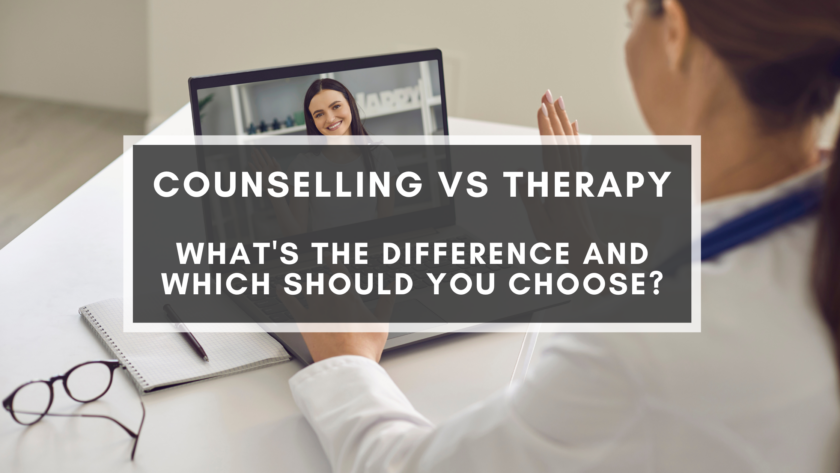When struggling with mental health issues like depression or anxiety, many people consider getting professional help but feel confused about the difference between Counselling and therapy. The terms are sometimes used interchangeably, but there are important distinctions between the two approaches. Understanding those differences can help you determine which option may work best for your needs.
This article will decode the key differences between Counselling and therapy, the conditions each tends to address, the general frameworks they follow, and more. Armed with this knowledge, you’ll be equipped to make an informed decision about which approach is right for you on your journey toward improved mental health.
What is Counselling?

Counselling aims to help people process challenges, trauma, relationships, major life changes, and normal developmental issues in order to improve overall well-being. Counsellors tend to take a wellness-based, prevention-focused approach that empowers people to better cope with life’s ups and downs.
The counsellor’s role is typically to listen, help reveal insights, improve communication skills, and promote realistic goal-setting and self-care strategies. Counselling utilises many theories of human growth and development to guide its practice.
Some key aspects that define professional Counselling include:
- Addresses everyday challenges and transitional issues
- Short-term, solution-focused
- Future-oriented
- Boosts self-awareness and coping abilities
- Collaborative relationship
What is Therapy?
Psychotherapy, or simply therapy, aims to help people heal from diagnosed mental health conditions like depression, PTSD, panic disorder, addictions, phobias, and more. It tends to dig deeper into the subconscious roots of issues to foster positive change from the inside out.
The therapist often takes a more active role using evidence-based techniques like cognitive-behavioural therapy (CBT) or eye movement desensitisation and reprocessing (EMDR) tailored to specific diagnoses. The power of the therapeutic relationship facilitates healing under the therapist’s guidance.
What Therapy Does for You:
- Addresses diagnosed psychological conditions
- Longer-term treatment
- Uncovers and shifts unconscious patterns
- Uses standardised techniques and assessments
- Directive relationship
As you can see, therapy zeroes in on clinically significant syndromes, while Counselling deals with challenges before they escalate into larger problems. Both play important yet distinct roles in caring for mental health.
Counsellor vs. Therapist Credentials
When researching counsellors compared to therapists, you’ll also notice differences in common educational backgrounds and licences between the two fields:
Counsellor Credentials
Counsellors often have a Master’s degree in Counselling, clinical mental health Counselling, Community Counselling, pastoral Counselling, or related mental health fields, along with national certifications and state licence to practise. Common licences include Licensed Professional Counselor (LPC), National Certified Counselor (NCC), and more.
Therapist Credentials
Therapists are most commonly clinical psychologists, clinical social workers, or mental health counsellors. The minimum credential to practice therapy is a Master’s degree, but many hold Doctoral degrees such as a PhD or PsyD. Common licences are Licensed Clinical Social Worker (LCSW) or Licensed Professional Clinical Counsellor (LPCC).
This overview shows that both counsellors and therapists complete graduate training and state-level vetting that enables them to safely and effectively care for clients. Yet the distinctions in their background, competencies, licences, and titles can set them up to fulfil different mental health roles.
The Interpretation of Counselling Approaches
There exist numerous therapeutic frameworks utilised by both counsellors and therapists alike. Below is a quick primer on Counselling approaches to further highlight how they tend to differ from strict psychotherapy modalities.
Humanistic Counselling
This Counselling style focuses on the inherent worth of all people. It helps clients get in touch with their authentic selves through increased self-awareness, self-actualization, and passion. There’s an emphasis on the Counselling relationship itself as a catalyst for growth.
Cognitive-Behavioural Counselling
While CBT is considered therapy, counsellors may use cognitive-behavioural theories to help clients identify unhealthy thoughts and behaviour patterns that don’t serve them. New coping statements and skills are introduced to aid positive change.
Solution-Focused Brief Counselling
This goal-directed Counselling style zeros in on solutions instead of problems. Sessions highlight strengths, visualise an ideal future, and identify small measurable steps to get there. The counsellor encourages accountability and progress.
As shown above, counsellors draw upon both Counselling-specific as well as clinical frameworks to empower change. The emphasis remains holistically strengthening mental fitness and resilience even when utilising therapy tools.
Here is the tabular representation of major differences between Counselling and Therapy
| Counselling | Therapy | |
| Goal | Cope with life challenges; improve overall wellness | Treat diagnosed mental health conditions |
| Timeframe | Short-term; solution-focused | Longer-term treatment |
| Approach | Collaborative discussions and practical support | Direct interventions using clinical techniques |
| Issues addressed | Relationships, work stress, grief, life transitions | Depression, anxiety, PTSD, addictions |
| Focus | Future-oriented; boost self-awareness and coping skills | Uncover and shift unconscious patterns |
| Techniques used | Varies; may include CBT elements | Standardised evidence-based protocols like CBT or EMDR |
| Provider education | Masters in Counselling or related field | PhD, PsyD, social work or clinical Counselling |
Counselling vs. Therapy: How to Choose What’s Right

When struggling with your mental health, how do you determine if Counselling or therapy better fits your current needs? Here are some questions to ask yourself when deciding:
- Are you predominantly struggling with everyday stress, relationships, life changes, or developmental issues like identity? If so, Counselling may suit you.
- Or have you noticed symptoms of a diagnosable condition like recurring panic attacks, flashbacks, intense compulsions, or suicidal thoughts? If so, therapy is warranted.
- Would you benefit more from proactive coping strategies or from treating past traumas and deeply rooted patterns? This distinction can point to Counselling or therapy as the right path.
- Are inner wisdom, self-awareness, and wellness or expert interventions with clinically proven techniques more aligned with your goals? Your learning suggests Counselling or therapy.
Ideally, reflect on your experiences with an expert guide who understands these nuances deeply. Click 2 Pro provides access to both compassionate counsellors and seasoned therapists to give your search a jumpstart. Their free consultations make it easy to discern if online Counselling or internet therapy seems like the best avenue to pursue better mental health in the year ahead. With expertise spanning from everyday struggles to diagnosable conditions, Click2Pro stands ready to support you.
Conclusion
In summary, Counselling and therapy both provide professional support for any stage of life’s journey. Their qualitative differences come down to general wellness versus treating illness, shorter-term coaching versus longer-term healing, and empowering self-awareness versus clinical interventions. Yet, at their core, both Counselling and therapy aim to foster authentic human thriving.
Understanding the nuances between these two modalities allows you to make an informed choice about what will most effectively meet your or your loved ones’ needs right now. Click2Pro’s network of licensed Counselling and therapy professionals offers the perfect starting point and guidance for this decision. Reach out today to start strengthening your mental health, whether through a Counselling wellness lens, therapy’s clinical care, or an integrated approach using both. The first step is seeking help – you’ve got this!
FAQs
Q1. How do Counselling and therapy differ?
Ans. Counselling develops coping skills for life’s challenges. Therapy clinically treats mental health conditions.
Q2. Should I get Counselling or therapy?
Ans. Get short-term Counselling for everyday issues. Seek ongoing therapy to resolve diagnosed conditions.
Q3. Is Counselling the same as psychology?
Ans. No. Counsellors have specialised master’s training. Psychologists study the science of human behaviour and mental processes.
Q4. How do counsellors and social workers differ?
Ans. Counsellors provide therapeutic support for individuals. Social workers connect people with community resources.
Q5. What is the cost of online Counselling or therapy in India?
Ans. Online Counselling in India ranges from ₹1,000-₹3,000 per 45-60 minute session. Online therapy costs ₹1,500-₹5,000+ per session.

